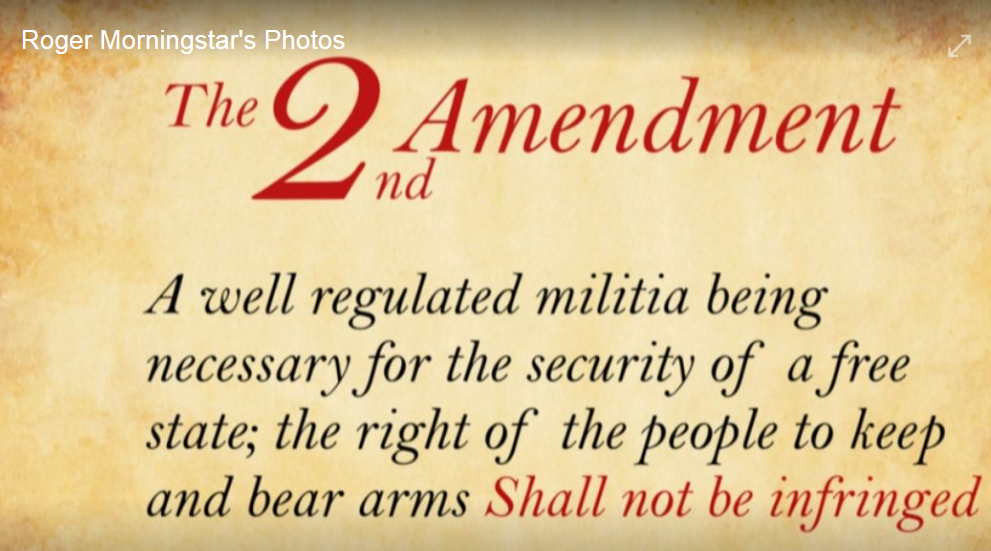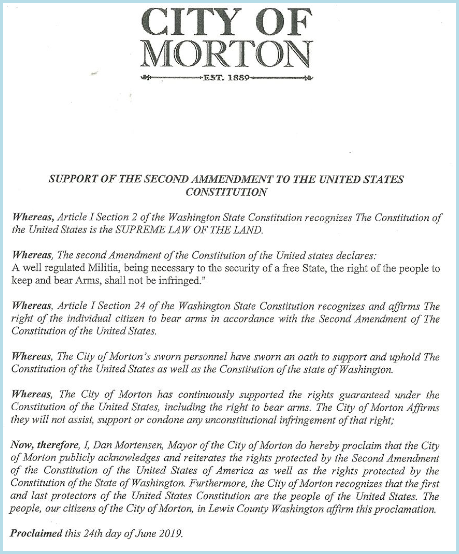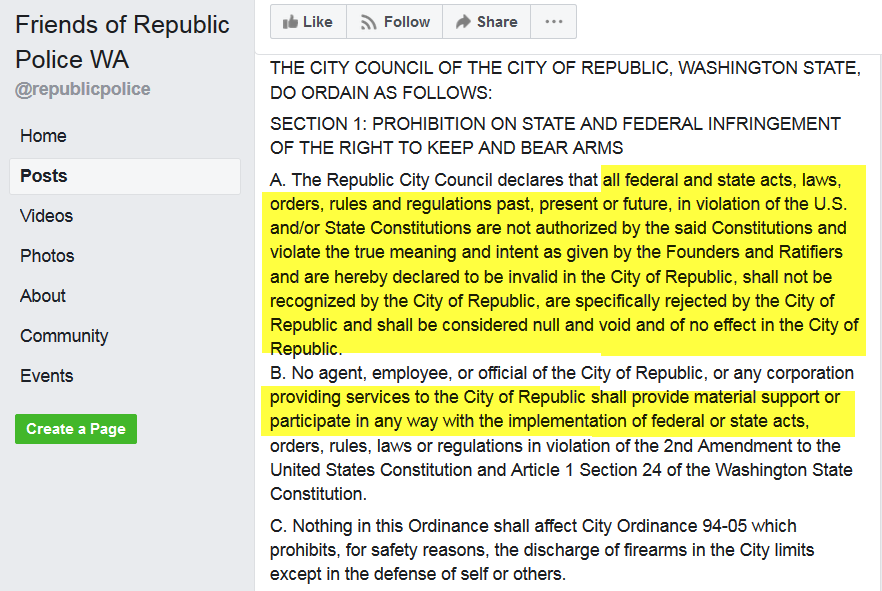In October, two law enforcement officers held a rally in Morton, Washington to protest gun safety rights, specifically Washington’s 2018 gun safety legislation, Initiative 1639.

Police Chief Roger Morningstar of Morton (pop. 1,159) and Police Chief Loren Culp of Republic (pop. 1,062) were featured speakers and hosts of a rally called “Sign the Proclamation — Second Amendment Rally”, sponsored by the Morton Rifle and Pistol Club.
Their stance is emblematic of a familiar refrain among voters — that the Second Amendment grants citizens the right to “keep and bear arms”, a right that “shall not be infringed”.

But the problem with a literal, word-for-word interpretation of the Second Amendment is … well, a word-for-word interpretation.
Ownership vs Transactions
The language “keep and bear arms” refers only to ownership. There is no language in the amendment that refers to selling, buying, trading, transferring or any other type of transactional or commercial relationship.
Every time gun enthusiasts emphasize the language of the Second Amendment they are, in effect, also damning the idea of unlimited rights when it comes to acquiring firearms. By claiming a word-for-word interpretation of rights the amendment grants, they’re also claiming the void — what it doesn’t grant.
The Supreme Court has consistently upheld laws regarding licensing and sales of firearms since 1938. And before that, individuals didn’t even have the right to own guns.
‘Individual’ Rights Have Only Existed Since 1856
As Supreme Court Justice Scalia explains in his summary opinion on District of Columbia vs Heller, the original and commonly accepted interpretation of the Second Amendment was that only those males called to serve as militia were entitled to own guns.
Scalia was well known as a conservative justice who advocated “pure textualism in statutory interpretation and originalism in constitutional interpretation.” In other words, Scalia adhered to the original text and meaning of the Constitution whenever reasonable and possible. Conservative justices Roberts and Alito also concurred in the Heller case.
Individuals gained the right to own firearms with Constitutional protection only after the 1856 Dred Scott vs Sanford decision — 70 years after the Constitution was created. The decision, which affirmed the right of slaves (but not women) to own guns, changed judicial philosophy regarding gun ownership.
The lesson for today is that the idea of individual rights to gun ownership did not exist when the Constitution was written. That right was not supported, promoted or upheld by the Founders or the judiciaries of their time.

‘I Fought the Law …’
Both Roger Morningstar and Loren Culp have stated that they do not support and will not enforce the new Washington law, which was passed in November 2018. Provisions went into effect in two stages, January and July 2019.
The new Washington law:
- Makes it illegal for a person under 21 to buy a semiauto/assault rifle, and illegal to sell or gift such a gun to them. But it does allow young adults age 18–21 to possess a semiauto/assault weapon in certain conditions like within the home, hunting, or target shooting. So in effect, if you already own the gun, or you possess the gun with permission within the boundaries, you’re fine. It just raises the age to purchase or acquire one.
- Requires enhanced background checks, training requirements and waiting periods for the purchase or transfer of semiauto/assault rifles.
- Imposes criminal liability for failure to safely secure a firearm if the gun turns up in a crime, suicide or accidental shooting by a non-owner. In other words, if your gun turns up bloodied and you don’t own and use a gun safe, you will face criminal liability. A biometric gun safe costs a fraction of what a handgun, ammo, and biometric-enabled iPhone cost. It’s unlikely that homeowners’ will want to use a rifle or shotgun for home defense, but just in case, there are slim biometric safes for long guns. (Personally, I am kind of partial to the chun-chunk sound of a shotgun, just to warn idiots off.)
- Safety warning and safe storage requirements for dealers.
But Morningstar, along with Mayor (and former Morton Police Chief) Dan Mortensen, and the entire Morton City Council posted a city proclamation defying the new regulations.
“All Federal Laws Are Hereby Invalid …”
City proclamations are generally used to declare special days for causes and charities. But in this case, a City of Morton proclamation reads, “The City of Morton … Affirms they will not assist, support or condone any unconstitutional infringement of that right …
In other words, these law enforcement officers and city officials are declaring that they will not abide by federal or state laws that they personally find onerous.

Chief Loren Culp of Republic, WA takes that stance even further. Culp, who self-published a book called American Cop: Upholding the Constitution and Defending Your Right to Bear Arms, has publicly stated that all federal laws “are hereby declared to be invalid in the City of Republic.”
According to Culp, “all federal and State acts, laws, orders, rules or regulations regarding firearms, firearm accessories, and ammunition are a violation of the 2nd Amendment.”

So, does the Second Amendment grant citizens the right to “keep and bear arms”, a right that “shall not be infringed”?
Yes, and no. If you were a black or a white male, that right was not individually granted until 1856, a lifetime after the Constitution was written. If you were a woman, that right was never specifically granted nor denied, and could be interpreted at will. In the 1800’s, a gun cost more than a horse or barn, and was therefore often considered worth more than a woman.
But hey, let’s not infringe those rights.
*In modern law, there are some gray areas in weapon and “destructive device” ownership, but SCOTUS adheres to a simple rule:The Constitution prevents an outright ban of most weapons — but it does not prevent controls on how weapons are sold and transferred.While Chicago’s complete handgun ban was overturned, a conservative Supreme Court reiterated in McDonald vs Chicago that a wide variety of state and local gun laws are constitutionally permissible.The McDonald decision stated that:“It is important to keep in mind that Heller, while striking down a law that prohibited the possession of handguns in the home, recognized that the right to keep and bear arms is not ‘a right to keep and carry any weapon whatsoever in any manner whatsoever and for whatever purpose.’”







